#capitol insurrection
Text
Brazil defended democracy more effectively than the US
Donald Trump and Jair Bolsonaro adopted similar strategies, but Brazil offered a stronger and faster response against threats to presidential election results than the United States.
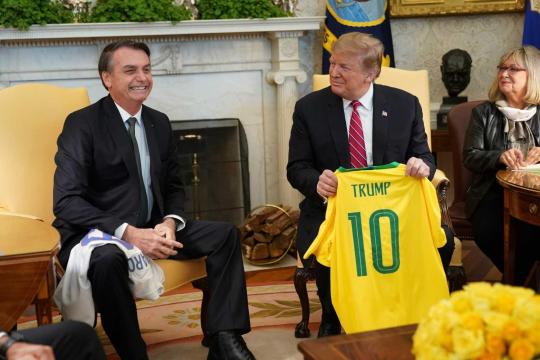
As presidents, both Donald Trump and Jair Bolsonaro posed a threat to democracy in the US and Brazil respectively. However, analysts agreed that Brazil is far more vulnerable to such a threat than the US. Democratic political institutions of the latter are considered to be more established and stable.
Brazil has experienced several collapses of democratic rule, usually through military intervention. The latest lasted 21 years, from 1964 to 1985, so democracy is still relatively young at 38 years, and political instability was common throughout most of the 20th century.
But after both Trump and Bolsonaro lost their bids for reelection in 2020 and 2022 respectively, Brazil reacted much more quickly and forcefully to Bolsonaro than the US did to Trump.
The two leaders employed similar strategies during their time in office to mobilise their supporters and cast doubt on election results. After they lost elections, both claimed the elections had been rigged.
In the US, a mob of Trump’s supporters stormed the Capitol on 6 January 2021, in an attempt to overturn the Electoral College vote, resulting in five casualties and more than a hundred injured people. Meanwhile, Brazil witnessed a similar event on 8 January 2023, when mobs, donned in the country’s colors, launched an attack on the Supreme Court headquarters, the Presidential palace and Congress in Brasília. Their goal was to violently overthrow the democratically elected President Luiz Inácio Lula da Silva, who had taken office on 1st January. The ensuing chaos resulted in widespread vandalism and the destruction of several historical and artistic works.
The similarities between the two events and the strategies used by Trump and Bolsonaro are not coincidental. Bolsonaro has made no attempt to hide the fact that he deliberately copied Trump’s playbook. However, the consequences of their failed challenges to election results were quite different in the US and Brazil.
Continue reading.
#brazil#brazilian politics#politics#united states#us politics#democracy#capitol insurrection#january 8#mod nise da silveira#image description in alt
38 notes
·
View notes
Text
Capitol rioters hope for Trump's return
#usa#joe biden#donald trump#trump 2024#trump#abortion#history#jan 6th#capitol insurrection#capitol attack#us elections
11 notes
·
View notes
Text
Ian Millhiser at Vox:
On Thursday, the Supreme Court will hear oral arguments in Trump v. United States, the case where former President Donald Trump claims that he is immune from prosecution for any “official acts” that he committed while in office.
It is, frankly, very difficult to care about this case or to spend mental energy teasing out what the justices may say in their opinions. That’s because Trump has already won.
Trump’s arguments in this case are exceedingly weak, and it is unlikely that even this Supreme Court, with its 6-3 Republican supermajority, will hold that Trump was allowed to do crimes while he was president. Trump’s immunity argument is so broad that his lawyer told a lower court that it would apply even if he ordered the military to kill one of his rivals. (Though Trump does concede that he could be prosecuted if he were first impeached and convicted.)
But this case was never actually about whether the Constitution allows a sitting president to avoid prosecution if he uses the powers of the presidency to commit crimes. Trump’s goal is not to win an improbable Supreme Court order holding that he can assassinate his political adversaries. It is to delay his criminal trial for attempting to overturn President Joe Biden’s victory in the 2020 election for as long as possible — and ideally, from Trump’s perspective, until after the 2024 election.
And the Supreme Court has been his willing patsy.
As a general rule, federal courts only permit one court to have jurisdiction over a case at a time. So once Trump appealed trial Judge Tanya Chutkan’s ruling that, no, presidents are not allowed to do crimes, Chutkan lost her authority to move forward with Trump’s criminal trial until after that appeal was resolved.
Special prosecutor Jack Smith understands this problem as well as anyone, which is why he wanted the Supreme Court to bypass an intermediate appeals court and rule immediately on Trump’s immunity claim last December. The justices denied that request. After the appeals court ruled, they also denied Smith’s request to resolve the case on an much more expedited schedule.
[...]
The legal arguments in the Trump v. US case, explained in case anyone actually cares
Trump’s lawyers seek to blur the line between civil lawsuits — the president actually is immune from being sued for official actions taken while in office — and criminal prosecutions.
Under the Supreme Court’s precedents, all government officials, from a rookie beat cop all the way up to the president, enjoy some degree of immunity from federal lawsuits filed by private citizens. If you follow debates about police reform, you’ve no doubt heard the term “qualified immunity.” This is a legal doctrine that often allows police officers (and most other government officials) to avoid liability when they violate a private citizen’s rights.
As the Supreme Court held in Harlow v. Fitzgerald (1982), “government officials performing discretionary functions, generally are shielded from liability for civil damages insofar as their conduct does not violate clearly established statutory or constitutional rights of which a reasonable person would have known.”
The purpose of this immunity is to protect government officials from the kind of liability that might deter them from performing their jobs well. Harlow argued that qualified immunity ensures that the stresses of litigation won’t divert “official energy from pressing public issues.” It prevents lawsuits from deterring “able citizens from acceptance of public office.” And the Court in Harlow also warned about “the danger that fear of being sued will ‘dampen the ardor of all but the most resolute, or the most irresponsible [public officials], in the unflinching discharge of their duties.’”
Yet, while qualified immunity often prevents civil lawsuits against police and other government officials from moving forward, it’s never been understood as a shield against criminal prosecution. Just ask Derek Chauvin, the police officer convicted of murdering George Floyd.
The Supreme Court has also ruled that a short list of government officials — prosecutors, judges, and the president — have “absolute immunity” from civil suits. This is because people who hold these three jobs are unusually vulnerable to harassment suits filed by private litigants. Prosecutors perform duties that require them to antagonize potential litigants: criminal defendants. And judges’ duties necessarily require them to rule in favor of some parties and against others — who might then turn around and sue the judge.
[...]
The best defense of the Supreme Court’s behavior in this case
The Court’s decision to delay Trump’s trial for months, rather than expediting this case as Smith requested, cannot be defended.
That said, in an op-ed published in the New York Times shortly after the Supreme Court decided to delay Trump’s trial, University of Texas law professor Lee Kovarsky made the strongest possible argument for giving the justices at least some time to come up with a nuanced approach to the question of whether a former president is sometimes immune from criminal prosecution.
Trump, Kovarsky argues, should not be given immunity from prosecution for attempting to overturn an election. But he warns that “American democracy is entering a perilous period of extreme polarization — one in which less malfeasant presidents may face frivolous, politicized prosecutions when they leave office.”
For this reason, Kovarsky argues that “the Supreme Court should seize this opportunity to develop a narrow presidential immunity in criminal cases” that would prevent a future president from, say, prosecuting President Biden for the crime of being a Democrat.
The problem with this argument, however, is that even if the current Supreme Court could come up with a legal framework that would allow Smith’s prosecution of Trump to move forward, while also screening out any future case where a president was prosecuted for improper reasons, there’s no reason to think that a future Supreme Court would hew to this framework.
Kovarsky is arguing that the Court should use the Trump case to establish a precedent that can guide its future decisions. A precedent like Roe v. Wade. Or like Lemon v. Kurtzman. Or like Regents of the University of California v. Bakke. Or like United States v. Miller. Or like any other precedent that this Supreme Court has tossed out after that decision fell out of favor with the Republican Party.
Donald Trump won the delay battle in Trump v. United States, even as the court hasn't issued a ruling yet on whether or not he has total presidential immunity.
#SCOTUS#Capitol Insurrection#Trump v. United States#Total Immunity#Donald Trump#Jack Smith#Tanya Chutkan
7 notes
·
View notes
Text
#comedy central#south park#season 26#sp spoilers#rick 💖💖💖#herb garrison#lgtq#gay#january 6#capitol insurrection
34 notes
·
View notes
Text
Recognizing Trump's Patterns and Rhetorical Tricks
Timothy Snyder, Yale University history professor: I mean the fascists authoritarians, they did not have to personally kill people. They used language. And that specific dehumanizing language - calling people 'beasts' and saying 'my opponents can't be in power because they are the ones who are on the side of the beasts'. That has a very specific history so the words are the actions. The words matter in themselves.
Interviewer: Because the goal is to get people to take on these ideas and deal with them.
Snyder: The goal is to say these 'other people on that side, the ones who help the animals, they are not real Americans'. 'They can't possibly be in power. They can't possibly be legitimate.'
And, so combining it with the notion of elections that are faked and the idea that they are on the side of the 'subhumans' is meant to rally people so that they think violence is acceptable, And we know this can work because his words caused violence on January 6 2021. He [Trump] knows it can work and that's what he is going for.
3/19/24 MSNBC
#trump#stirring anger#authoritarian#elections2024#january 6 2021#capitol insurrection#speeches promoting violence#timothy snyder
3 notes
·
View notes
Link

https://twitter.com/JRubinBlogger
63 notes
·
View notes
Text
Suspect in Cincinnati FBI breach may have posted on Trump's Truth Social during incident
"If you don't hear from me, it is true I tried attacking the F.B.I.," one post reads.
"I'm having trouble getting information, but Viva Frei said patriots are heading to Palm Beach (where Mar A Lago is). I recommend going, and being Florida, I think the feds won't break it up. IF they do, kill them." (Viva Frei is a right-wing YouTube personality.)
--
trump's beloveds. Trying to kill FBI and other law enforcement officials. This is how MAGA backs the blue?
What happened to Back the Blue? Aren't the Republicans the party of LAW AND ORDER?
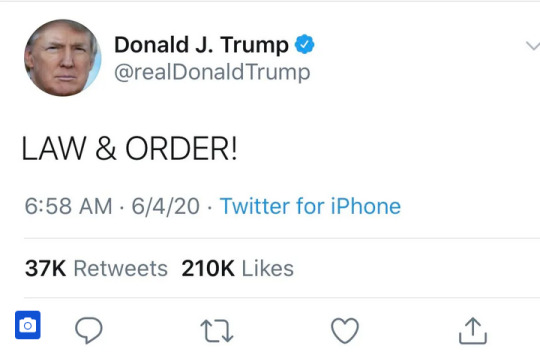
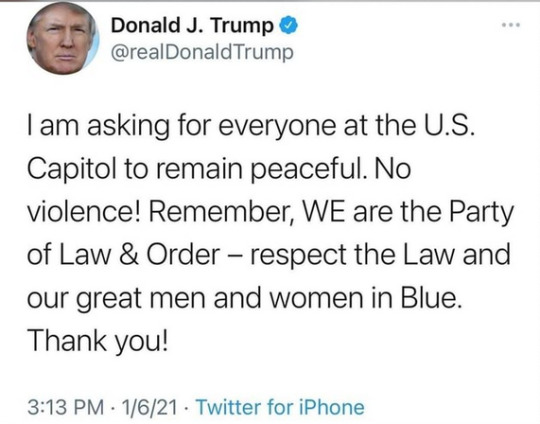
#Ricky Shiffer#cinncinati#Cincinnati FBI#maga#back the blue#LAW & ORDER#Republicans#party of law and order#Viva Frei#Truth Social#donald trump#donald trump is guilty#lock him up#jan6#jan 6#capitol insurrection
78 notes
·
View notes
Text
7 notes
·
View notes
Text
Colorado kicking Trump off the 2024 ballot for being an insurrectionist sack of mold is incredible but I'm not gonna celebrate quite yet since I have no faith that our psychotic Christian-Fascist supreme court will allow Trump to face actual consequences for his coup attempt
#politics#us politics#trump#donald trump#fuck trump#Colorado supreme court#Colorado#supreme court#january 6th#capitol insurrection#republicans#conservatives#fascisim#fascists#fuck fascism#2024 elections#joe biden
5 notes
·
View notes
Text
after not keeping up with the january sixth trials like I probably should’ve been, I’m baffled
there’s overwhelming incriminating evidence for trump, including but not limited to inciting the attack on the capital, advocating for violence against someone who opposed him, and when he was told they weren’t going back to the capital, tried to take the wheel of the car and then tried to choke his head of security who was trying to stop him
it’s absurd and it’s even more absurd knowing that there is a very fair chance that nothing is going to come of this, but by God, there’s nothing I’d love more than to see that fucker in prison & ineligible to ever run for president again
#us politics#us congress#january 6th#Jan 6#jan 6 hearings#jan 6 committee#politics#scotus#january 6#trump#donald trump#fuck trump#mike pence#absolutely wild#capitol insurrection#us capitol
42 notes
·
View notes
Text

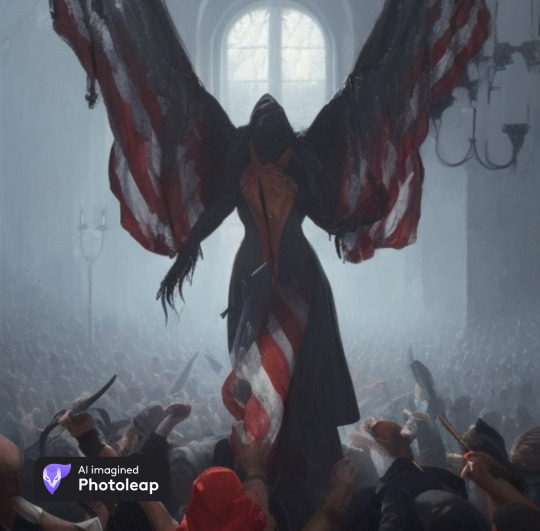
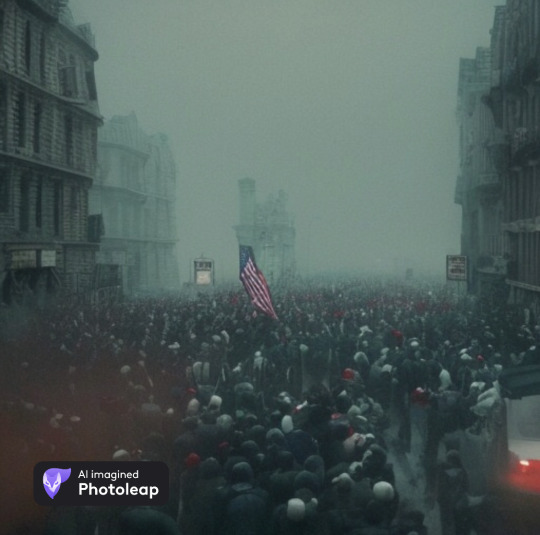
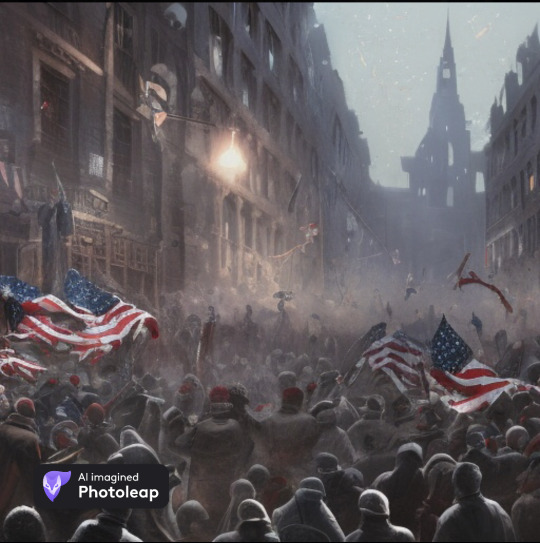
Decided to replace "Washington DC" with "Yharnam" when describing January 6 Capitol Insurrection on Photoleap and this is the result
7 notes
·
View notes
Text
This deserves a great deal of attention from all of us. I feel Brazilian twitter is exactly the opposite of American twitter which would be closer to what Elon musk is doing to the American twitter. However, Elon musk is treating the Brazilian twitter the opposite of the way he’s promoting his ideas.
3 notes
·
View notes
Link
I vowed to protect this land from foreign and domestic terrorists. The Republicans in office on that list, Military and Law enforcement step down now. You cannot serve the U.S. government while affiliated with a militia to sabotage our government. Homeland Security, handle it. Treason.
#anti-government#capitol insurrection#january 6#law enforcement#oath keepers#Treason#Department of Homeland Security#homeland security
5 notes
·
View notes
Text
Ian Millhiser at Vox:
The Supreme Court spent about an hour and a half on Tuesday morning arguing over whether to make it much harder for the Justice Department to prosecute hundreds of people who joined the January 6, 2021, attack on the US Capitol.
It appears, after Tuesday’s arguments, that a majority of the justices will side with the insurrectionists — though it is far from clear how those justices will justify such an outcome.
The case, known as Fischer v. United States, involved a federal law which provides that anyone who “obstructs, influences, or impedes any official proceeding, or attempts to do so” commits a very serious federal felony and can be imprisoned for up to 20 years — although, as Solicitor General Elizabeth Prelogar pointed out during Tuesday’s argument, actual sentences against January 6 defendants convicted under this statute have been much shorter, normally ranging from a little less than one year to slightly over two years.
According to the Justice Department, more than 1,265 people have been arrested for playing some role in the attack on the Capitol. Approximately 330 of them have been charged under the obstruction statute at issue in Fischer. One of them is Donald Trump.
As a federal appeals court held in its decision in this case, the obstruction statute is pretty darn clear that it applies to an effort to obstruct any congressional proceeding intended to certify the result of a presidential election — like the proceeding that the January 6 rioters attacked. And very few of the justices seemed to agree with Jeffrey Green, the lawyer representing a January 6 defendant, who proposed one way to read the statute more narrowly.
Nevertheless, many of the justices expressed concerns that the law sweeps too broadly and that it must be narrowed to prevent people who engage in relatively benign activity from being prosecuted.
Justice Samuel Alito, for example, expressed uncharacteristic sympathy for hecklers who interrupt a Supreme Court hearing — suggesting that prosecuting them under a statute that can carry a 20-year sentence goes too far. Justice Neil Gorsuch expressed similar concerns about prosecuting someone who peacefully conducts a sit-in to delay a court hearing, or someone who pulls a fire alarm to disrupt an official proceeding.
Indeed, Tuesday’s argument had a bit of a split personality. During Green’s time at the podium, most of the justices took turns criticizing his attempts to read the ban on obstructing an official proceeding narrowly. Even Alito, who is normally the Court’s most reliable vote for any outcome preferred by the Republican Party, got in on the game — telling Green that he “may be biting off more than [he] can chew” by arguing that the statute must be read to benefit his client.
By the time Green sat down, it appeared that he could lose in a 9–0 decision.
But any optimism that the Justice Department might have had early on in the argument must have been shattered almost as soon as Prelogar began her argument. Most of the justices peppered her with skeptical questions, although the justices who seemed to want to limit the obstruction statute struggled to agree on a single legal theory that would allow them to do so.
So the bottom line is that this case is probably going to end well for many January 6 defendants, but it is far from clear how the Court will justify such an outcome.
[...]
The Court’s sympathy for political protesters appears to be quite selective
Much of the skepticism Prelogar faced seemed to be rooted in some of the justices’ fears that ordinary political protests may be squelched by an overbroad reading of the obstruction statute. So it is worth noting another decision that the Court handed down just one day before the argument in Fischer.
In Mckesson v. Doe, the right-wing United States Court of Appeals for the Fifth Circuit effectively eliminated the right to organize a political protest — holding that protest leaders could face ruinous financial liability if a single protest attendee commits an illegal act. This decision is completely at odds with a long line of the Supreme Court’s First Amendment precedents.
And yet, on Monday, the Court announced that it would not hear the Mckesson case, leaving the Fifth Circuit’s decision in place.
It is still possible that the Supreme Court will correct the Fifth Circuit’s error in Mckesson at some later date. But it’s notable that the Court felt no urgency to do so in that case, while it spent the Fischer argument thinking about how to shut down some hypothetical future case where the government may not show adequate respect for First Amendment rights.
The Mckesson case, moreover, involved a Black Lives Matter protest, while the Fischer case involved a pro-Trump insurrection.
If nothing else, this is a terrible look for the Supreme Court. And it suggests that many of the justices’ concerns about free speech depend on whether they agree with the political views of the speaker.
Based on the oral arguments heard in the Fischer v. United States case at SCOTUS, the right-wing majority on the court is likely to side with Capitol Insurrectionists charged with obstructing an official proceeding.
Combined with this and the refusal to take up McKesson v. Doe, SCOTUS is in the tank for sympathies for right-wing protesters.
See Also:
HuffPost: Supreme Court Conservatives Appear Skeptical Of The Law Used To Charge Hundreds Of Jan. 6 Insurrectionists
#SCOTUS#Capitol Insurrection#Fischer v. United States#Donald Trump#US Department of Justice#Elizabeth Prelogar#Jeffrey Green#Joseph Fischer#McKesson v. Doe
11 notes
·
View notes
Text
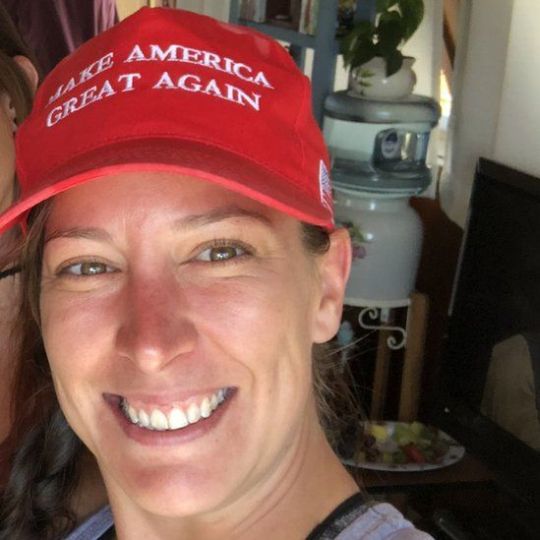
Two years ago insurrectionist traitor Ashli Babbitt was shot dead by a Capitol Hill police officer.
1/6 shall henceforth be known as Fuck Around and Find Out Day. As white supremacists tell black people
OBEY THE LAW AND YOU WON'T BE SHOT!!!
Got a problem with that, subhuman MAGA trash? Off is the direction in which you must immediately fuck. Your arguments will be disregarded and blocked.
Zero tolerance, zero room for discussion. I take pleasure in your pain as you cry about Babbitt.
This is payback for Trayvon Martin, Michael Brown, Sandra Bland, and all the other unarmed black people who died at the hands of cops.
#ashli babbitt#obey the law#traitor#insurrectionist#maga#fuck maga#maga kiss my ass you subhuman trash#white supremacism#capitol insurrection#insurrection#treason#tre45on
4 notes
·
View notes
Link
LETTERS FROM AN AMERICAN
July 21, 2022
Heather Cox Richardson
Tonight’s public hearing of the House Select Committee to Investigate the January 6th Attack on the U.S. Capitol laid responsibility for the crisis at the Capitol on former president Trump.
The committee’s chair, Bennie Thompson (D-MS), is isolating with Covid, so Vice Chair Liz Cheney (R-WY) presided over the hearing. She began with a tribute to Representative Thompson. Scott Simon, the host of NPR’s Weekend Edition, noted that “the Democratic chair of the committee just gracefully, and with full confidence, turned over the running of tonight’s hearing to the vice-chair, who happens to be of another party, and they spoke with mutual trust and respect. That’s how it’s supposed to go.”
The representatives running the hearing were also from different parties, and they referred to each other during the evening not just as colleagues but as friends. With the focus tonight on Trump’s dereliction of duty and violation of his oath of office, two representatives who are also veterans ran tonight’s hearing. Representative Elaine Luria (D-VA) spent 20 years as an officer of the U.S. Navy; Representative Adam Kinzinger (R-IL) joined the U.S. Air Force in 2003 and continues to serve in the Air National Guard.
The committee focused on the 187 minutes—over three hours—between the end of Trump’s speech at the Ellipse in which he urged “an angry armed mob” to march on the Capitol, at a time when it was already under siege, to the moment when he finally told the mob to go home. Within 15 minutes of his speech, Trump had been informed that the Capitol was under attack, and the White House knew some of the rioters were armed. (This keeps tripping me up. If Secret Service agents knew there were weapons near the president, why on earth didn’t they lock the place down rather than let the president just go back to the residence?)
For the next 2.5 hours, Luria pointed out, Trump “did not call Vice President Pence, senior law enforcement officials, military leaders, or DC government officials.”
Instead, as the crisis unfolded, Trump watched coverage of the Capitol riot on the Fox News Channel in the White House dining room. The committee noted that there are no official records from that time. The call logs are blank. The presidential daily diary is blank. The White House photographer was told she couldn’t take pictures. Witnesses, though, have established that advisors, members of Congress, media personalities, and family members all begged him to call off the violent mob he had sent to the Capitol, but he refused. Trump’s White House counsel Pat Cipollone told the committee that none of the White House staff wanted the riot to continue, wording that statement in such a way that he left the impression that the president himself did want it to.
Trump did not fail to act to end the siege, the committee said; he chose not to act. He let the violence continue because the armed mob was giving him what he wanted: the delaying of the electoral count. While he did not call law enforcement officers or other officials to restore order during those 187 minutes, he did talk to lawyer and loyalist Rudy Giuliani, and to senators to get them to slow down the counting of the electoral votes.
Not only did Trump not stop the violence, he tweeted out a link to his Ellipse speech at 1:49, just as police were declaring a riot at the Capitol. Then he “poured gasoline on the fire,” witnesses said, with his 2:24 tweet accusing Pence of cowardice, putting a target on his own vice president’s back, as the committee put it. That tweet led to an immediate escalation in the violence, and at 2:26, Pence had to be evacuated to an even more secure location. He came within forty feet of the rioters, and the situation was so dangerous that Secret Service agents were calling their families to say goodbye.
At 2:38, Trump responded to his advisors’ urging to call off his supporters by tweeting: “Please support our Capitol Police and Law Enforcement. They are truly on the side of our Country. Stay peaceful!” Rioters noted that he told them only to respect the police, not lawmakers, and that he did not tell them to go home. At that point, lawmakers were hiding in the House chamber with gas masks.
The hard fighting continued until 4:17, when Trump finally released the video telling the mob, “Go home, we love you, you’re very special.” The committee established that he released the video only after law enforcement was deployed and was gaining control of the Capitol, making it clear the violent insurrection would not succeed. And, as aides had been saying all day, as soon as Trump told the crowd to go home, it began to disperse. “That’s an order,” one rioter said, although fighting did continue for a while. At 6:01, Trump tweeted that the attackers were “great patriots.”
It was not until January 7, with talk of removing him from offices swirling around the White House, that Trump issued a three-minute video saying that he was “outraged by the violence” and that anyone who had broken a law the day before would be prosecuted. He reassured the country that there would be an orderly transition of power. But outtakes from that taping show Ivanka coaching him and Trump saying he was still unwilling to give up the Big Lie. “I don’t want to say the election is over,” he said. “I just want to say Congress has certified the results.”
And, of course, Trump has never stopped insisting that he won the election and thus continues to threaten our democracy. As Kinzinger said, “The forces Donald Trump ignited that day have not gone away. The militant, intolerant ideologies. The militias, the alienation and the disaffection. The weird fantasies and disinformation. They're all still out there. Ready to go."
In addition to bringing the story of Trump’s attempt to steal the election to its finale, the hearing seemed designed to loosen the loyalty of Trump supporters to the man who had, as Cheney said, taken advantage of their love of country to use them to overturn our democracy.
The committee contrasted Trump’s behavior with that of then–Senate majority leader Mitch McConnell (R-KY) and then–Senate minority leader Chuck Schumer (D-NY), who were determined to resume the joint session and count the electoral votes. They also held up then–Vice President Pence as a model, showing him working to get the crisis under control even while being held in a secret location that looked much like a parking garage to stay out of the hands of the people calling for his death. Chairman of the Joint Chiefs of Staff Mark A. Milley told the committee that Pence was issuing orders to the acting secretary of defense, Christopher Miller. (Why were people following Pence’s orders?)
The committee’s witnesses tonight, former deputy national security advisor Matthew Pottinger and former deputy press secretary Sarah Matthews, were staunch Trump supporters who found the 2:24 tweet so offensive they resigned that night. The committee has heard almost exclusively from loyal Republicans, a strategy designed to undercut Trump’s cries that it is being run by Democrats. It also played several clips of McConnell and House minority leader Kevin McCarthy (R-CA) blaming Trump for the insurrection (there is a barb for McCarthy because he has switched back to Trump’s support and turned against Cheney over it).
Outtakes of the January 7 video recording tonight punctured Trump’s image as a strong leader: he repeatedly mangles simple language and takes out the word “yesterday” because it is a “hard word for me.” He repeatedly hits the podium in frustration. CNN’s chief White House correspondent Kaitlan Collins tweeted that multiple sources said it took Trump about an hour to record the three-minute video. His obstinacy made him look isolated and unreasonable; the outtakes made him seem pathetic and childish.
For all that, Trump fared better than Senator Josh Hawley (R-MO), the first senator to say he would empower the House Trump loyalists by contesting some of the state votes, who famously raised a fist in solidarity with the protestors on the morning of January 6. The committee showed the image of Hawley raising his fist…and then showed footage of him running at top speed through the Capitol when the rioters broke in. Across the internet, users have been poking fun at Hawley, who has recently been on a crusade to launch what he calls an imperative “revival of strong and healthy manhood in America” and “traditional masculine virtues.” They have been posting pictures of the video to the theme from the running movie Chariots of Fire, for example, and pictures of running chickens. As journalist Adam Serwer tweeted, “Hawley riling up the mob and then fleeing in terror is an incredible political metaphor.”
At the end of the hearing, Cheney praised the witnesses, especially the women. She offered special thanks to Cassidy Hutchinson, who “knew all along that she would be attacked by President Trump, and by the 50-, 60-, and 70-year-old men who hide behind executive privilege,” but had courage to testify nonetheless. Cheney mentioned the female witnesses by name, saying they were “an inspiration to American women and to American girls.”
Cheney then spoke to Trump supporters, reminding them that the testimony had come from Republicans who supported Trump. She played the recently discovered audio clip of Trump confidant Stephen K. Bannon on October 31, 2020, four days before the election, explaining with laughter that Trump would simply declare victory even if he lost. Cheney explained to supporters that they had been set up.
Flattering them, she said Trump knew he could convince his supporters that the election was stolen because he knew they loved their country and that they would put their lives at stake for it, “preying on their patriotism…on their sense of justice.” “On January 6th, Donald Trump turned their love of country into a weapon against our Capitol and our Constitution.”
Speaking especially to the American women whose votes will be key to the upcoming election, she noted that the room in which they were meeting was where the committee on women’s suffrage met in 1918. We… “have a solemn obligation not to idly squander what so many Americans have fought and died for.”
Cheney noted that the hearings have brought new information. “Doors have opened, new subpoenas have been issued, and the dam has begun to break,” she said. The committee will hold more public hearings in September.
—
Notes:
Adam Serwer 🍝 @AdamSerwerHawley riling up the mob and then fleeing in terror is an incredible political metaphor Sen. Josh Hawley (R-MO) — who raised his fist in support of the Capitol insurrectionists earlier in the day — runs for his life from the rioters inside the building in never-before-seen video. https://t.co/GU1L8ttN8u
The Recount @therecount
1,202 Retweets6,025 Likes
July 22nd 2022
Norah O'Donnell 🇺🇸 @NorahODonnellThe committee reveals the outtakes from the Trump's address to the nation on January 7th in never-before-seen raw footage. "I can't say that..." "I don't want to say the election's over..." #January6thCommitteeHearing
363 Retweets1,041 Likes
July 22nd 2022
ABC News @ABCRep. Kinzinger: “The forces Donald Trump ignited that day have not gone away. The militant, intolerant ideologies. The militias, the alienation and the disaffection. The weird fantasies and disinformation. They're all still out there. Ready to go."
abcn.ws/3PKnOFh
148 Retweets479 Likes
July 22nd 2022
John Harwood @JohnJHarwoodso the two allegedly itching to publicly contradict Cassidy Hutchinson have lawyered up Asked by @AnnieGrayerCNN whether Tony Oranto and Robert Engel are the secret service officials who retained private counsel, Rep. Lofgren says “yes, and the driver”
Nicholas Wu @nicholaswu12
326 Retweets1,379 Likes
July 22nd 2022
Scott Simon @nprscottsimonI just want to note the Democratic chair of the committee just gracefully, and with full confidence, turned over the running of tonight’s hearing to the vice-chair, who happens to be of another party, and they spoke with mutual trust and respect. That’s how it’s supposed to go.
4,634 Retweets37,443 Likes
July 22nd 2022
https://www.npr.org/2021/11/11/1054615028/is-masculinity-under-attack-sen-hawley-wants-to-defend-the-men-of-america
LETTERS FROM AN AMERICAN
HEATHER COX RICHARDSON
[from comments]
Steve Branz
Two big "aha" moments for me: (1) "...The committee established that he released the video only after law enforcement was deployed and was gaining control of the Capitol, making it clear the violent insurrection would not succeed." I am now convinced that if law enforcement had not gotten the upper hand, Trump's video would not have been released when it was; and (2) the "Outtakes of the January 7 video recording" showed that on top of his sheer evil nature, Trump is at his core a pathetic excuse for a human being, let alone the Leader of the Free World.
+
Steve Yarbrough
I’m especially glad that Hawley was shown to be an absolutely venal, craven opportunist. I hope the history books juxtapose the raised fist photo beside the still of him running for his life. That’s how he should be remembered.
#Heather Cox Richardson#Letters From An American#January 6 2021#January 6 Commission#Corrupt GOP#Criminal GOP#history#Capitol Insurrection
4 notes
·
View notes